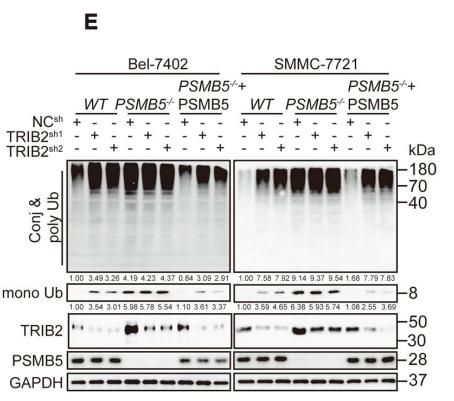PSMB5 Antibody - #DF6728
| Product: | PSMB5 Antibody |
| Catalog: | DF6728 |
| Description: | Rabbit polyclonal antibody to PSMB5 |
| Application: | WB IHC |
| Cited expt.: | WB |
| Reactivity: | Human, Mouse, Rat |
| Prediction: | Bovine, Horse, Sheep, Rabbit, Dog, Xenopus |
| Mol.Wt.: | 28kDa, 20 kDa; 28kD(Calculated). |
| Uniprot: | P28074 |
| RRID: | AB_2838690 |
Related Downloads
Protocols
Product Info
*The optimal dilutions should be determined by the end user. For optimal experimental results, antibody reuse is not recommended.
*Tips:
WB: For western blot detection of denatured protein samples. IHC: For immunohistochemical detection of paraffin sections (IHC-p) or frozen sections (IHC-f) of tissue samples. IF/ICC: For immunofluorescence detection of cell samples. ELISA(peptide): For ELISA detection of antigenic peptide.
Cite Format: Affinity Biosciences Cat# DF6728, RRID:AB_2838690.
Fold/Unfold
DKFZp459C139; EC 3.4.25.1; LMPX; Macropain epsilon chain; MB1; MGC104214; MGC118075; MGC134464; Multicatalytic endopeptidase complex epsilon chain; Proteasome (prosome, macropain) subunit, beta type, 5; Proteasome beta 5 subunit; Proteasome catalytic subunit 3; Proteasome chain 6; Proteasome epsilon chain; Proteasome subunit beta type-5; Proteasome subunit MB1; Proteasome subunit X; Proteasome subunit, beta type, 5; Proteasome subunit, beta-5; PSB5_HUMAN; PSMB5; PSX large multifunctional protease X; X;
Immunogens
A synthesized peptide derived from human PSMB5, corresponding to a region within C-terminal amino acids.
- P28074 PSB5_HUMAN:
- Protein BLAST With
- NCBI/
- ExPASy/
- Uniprot
MALASVLERPLPVNQRGFFGLGGRADLLDLGPGSLSDGLSLAAPGWGVPEEPGIEMLHGTTTLAFKFRHGVIVAADSRATAGAYIASQTVKKVIEINPYLLGTMAGGAADCSFWERLLARQCRIYELRNKERISVAAASKLLANMVYQYKGMGLSMGTMICGWDKRGPGLYYVDSEGNRISGATFSVGSGSVYAYGVMDRGYSYDLEVEQAYDLARRAIYQATYRDAYSGGAVNLYHVREDGWIRVSSDNVADLHEKYSGSTP
Predictions
Score>80(red) has high confidence and is suggested to be used for WB detection. *The prediction model is mainly based on the alignment of immunogen sequences, the results are for reference only, not as the basis of quality assurance.
High(score>80) Medium(80>score>50) Low(score<50) No confidence
Research Backgrounds
Component of the 20S core proteasome complex involved in the proteolytic degradation of most intracellular proteins. This complex plays numerous essential roles within the cell by associating with different regulatory particles. Associated with two 19S regulatory particles, forms the 26S proteasome and thus participates in the ATP-dependent degradation of ubiquitinated proteins. The 26S proteasome plays a key role in the maintenance of protein homeostasis by removing misfolded or damaged proteins that could impair cellular functions, and by removing proteins whose functions are no longer required. Associated with the PA200 or PA28, the 20S proteasome mediates ubiquitin-independent protein degradation. This type of proteolysis is required in several pathways including spermatogenesis (20S-PA200 complex) or generation of a subset of MHC class I-presented antigenic peptides (20S-PA28 complex). Within the 20S core complex, PSMB5 displays a chymotrypsin-like activity.
Cytoplasm. Nucleus.
Belongs to the peptidase T1B family.
Research Fields
· Genetic Information Processing > Folding, sorting and degradation > Proteasome.
References
Application: WB Species: human Sample: Bel-7402 and SMMC7721 cells
Application: IF/ICC Species: human Sample: Bel-7402 and SMMC7721 cells
Application: WB Species: human Sample: SK-Hep1 cells
Restrictive clause
Affinity Biosciences tests all products strictly. Citations are provided as a resource for additional applications that have not been validated by Affinity Biosciences. Please choose the appropriate format for each application and consult Materials and Methods sections for additional details about the use of any product in these publications.
For Research Use Only.
Not for use in diagnostic or therapeutic procedures. Not for resale. Not for distribution without written consent. Affinity Biosciences will not be held responsible for patent infringement or other violations that may occur with the use of our products. Affinity Biosciences, Affinity Biosciences Logo and all other trademarks are the property of Affinity Biosciences LTD.






